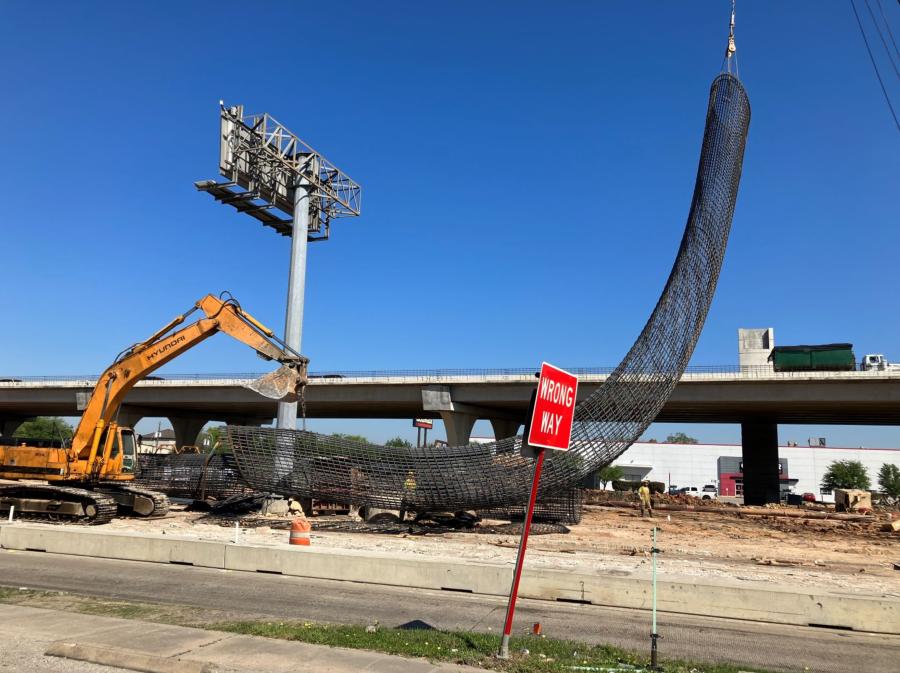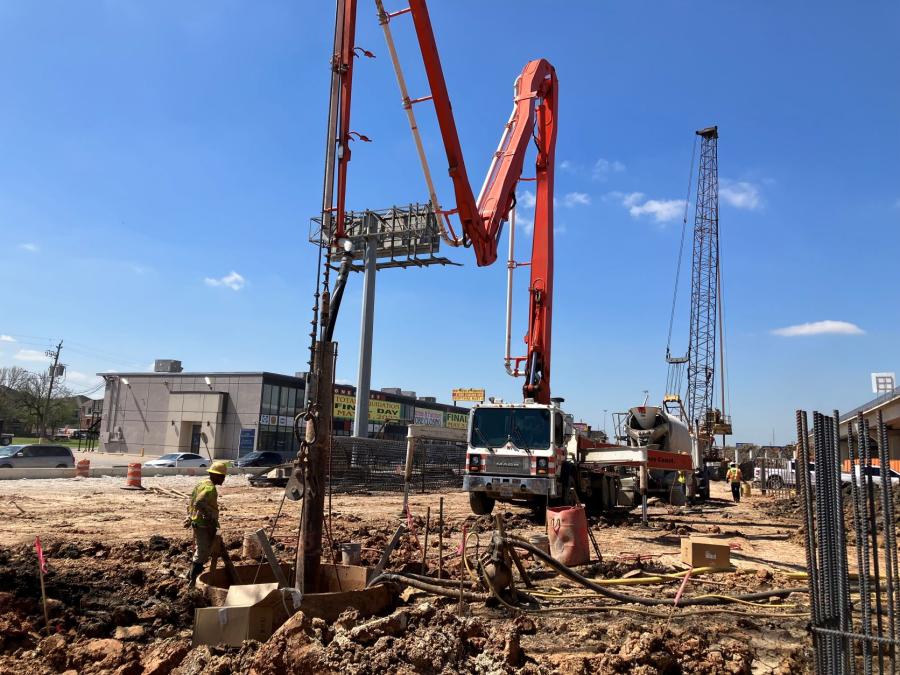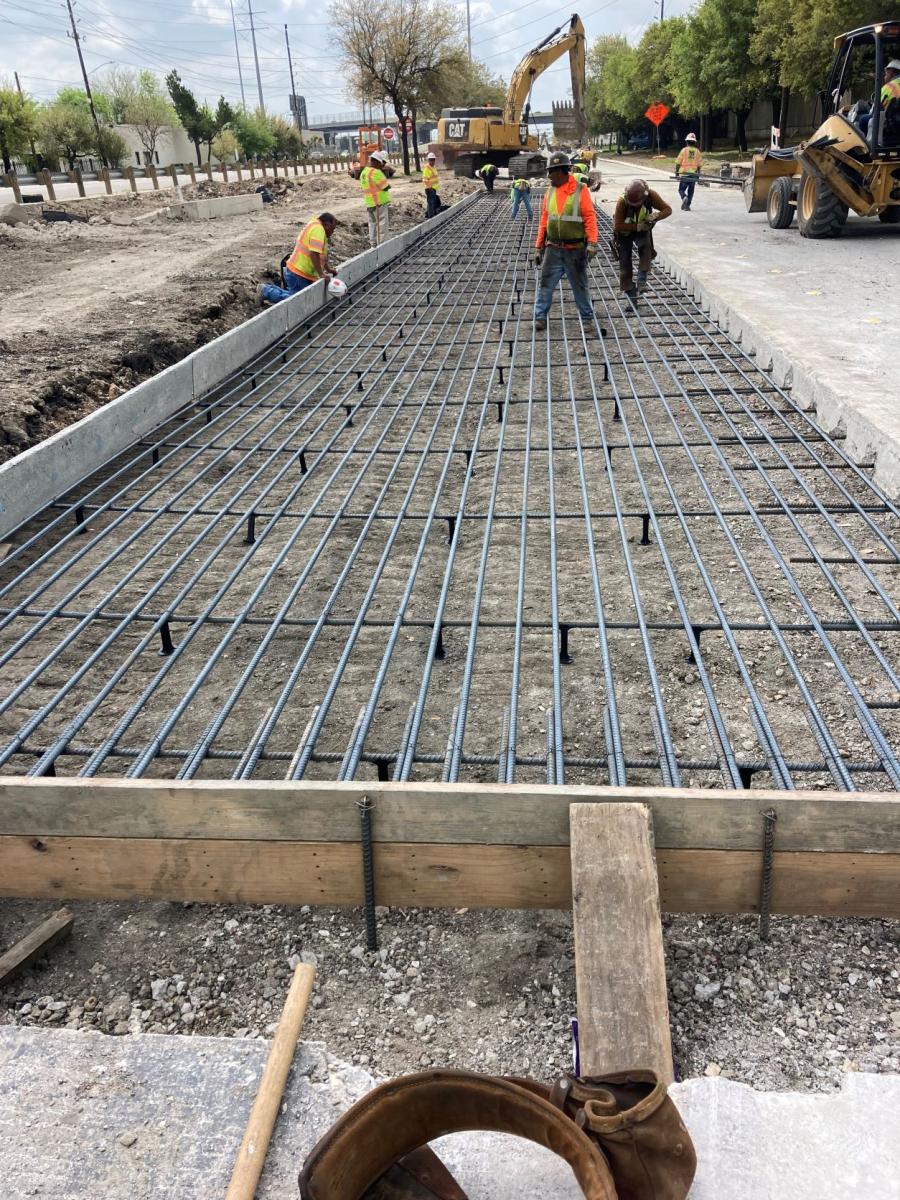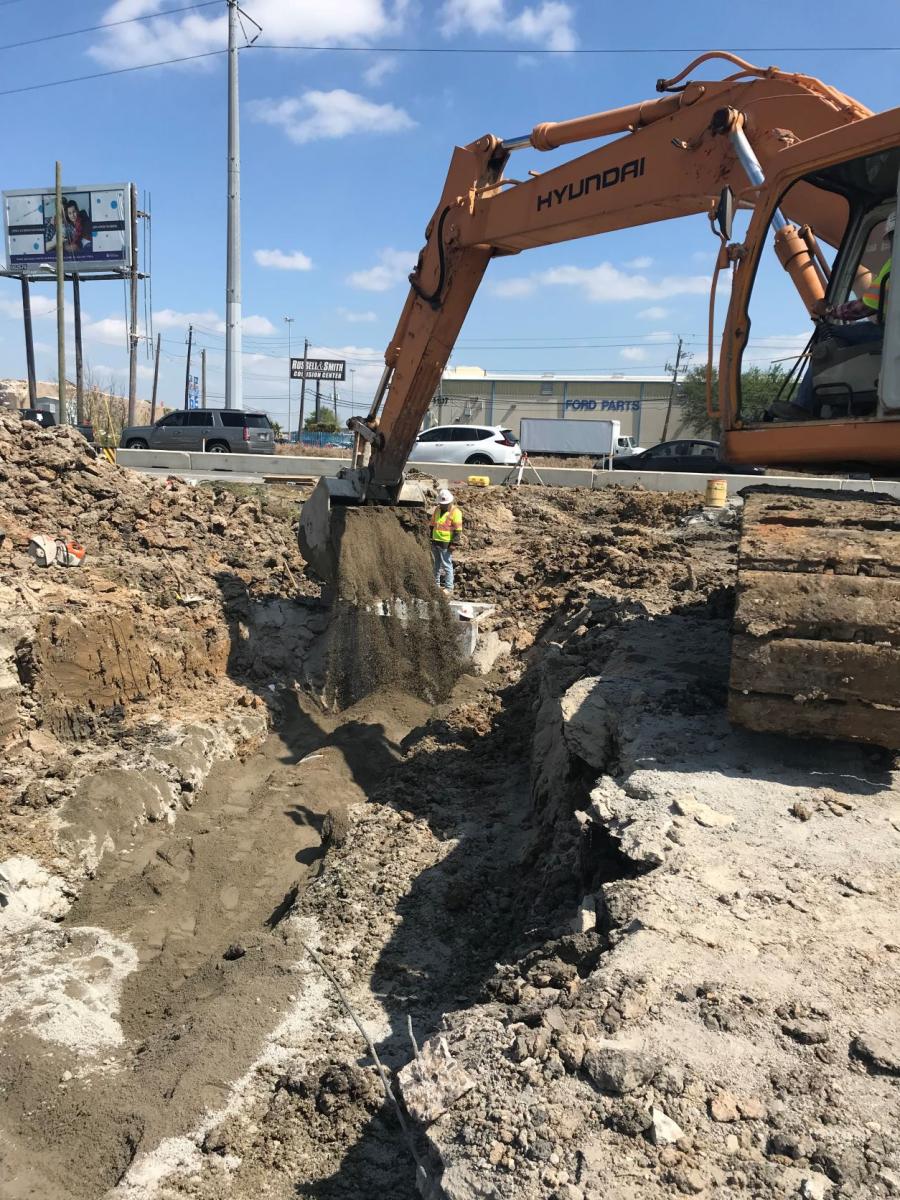Williams Brothers Construction Co. is the general contractor tasked with completing the $116 million Interstate 610/Cambridge project. Here, a Hyundai excavator is working in tandem with a crane to place the rebar inside the shafts at the Mainline Bridge prior to concrete being poured inside them.
(Photo courtesy of TxDOT.)
The Texas Department of Transportation (TxDOT) is investing $116 million for its Interstate 610/Cambridge project in the south-central area of Houston, which will create multiple connecting points to major event venues such as NRG Stadium, the Museum District, multiple universities and the Medical Center.
The project is designed to reduce congestion, add capacity, create better connectivity with State Highway 288 and improve overall mobility in the area.
The work is being performed by Williams Brothers Construction Co. Inc. as part of the Texas Clear Lanes initiative. The project includes the reconstruction of mainlanes, frontage roads and the addition of a freeway overpass with eight direct connect tie-ins at I-610/SH 288.
Ongoing Construction
Current construction activity is action packed. The I-610 South Loop eastbound mainlanes between Fannin Street and Scott Street are being reconstructed, with an anticipated completion in late 2024. This includes: removing the old retaining walls from the I-610 bridge over FM 521/Almeda Road and installing drill shafts for the proposed new bridge over
FM 521/Almeda Road; installation of the proposed retaining walls for the new bridge over FM 521/Almeda Road and the computerized transportation management system and signal systems for the new proposed Cambridge intersection that will cross under I-610 South Loop mainlanes; and adding sidewalks along FM 521/Almeda Road and the I-610 eastbound frontage road where sections of roadway are completed.
Storm sewer work continues along the I-610 eastbound frontage road, including along FM 521/Almeda Road and a small section of the I-610 westbound frontage road just west of FM 521/Almeda Road Storm sewer system infrastructure also is being placed along sections of the new proposed I-610 eastbound mainlanes and within the proposed retaining walls.
The I-610 South Loop eastbound frontage road from Fannin to SH 288 is under construction with an estimated completion in spring 2024. FM 521/Almeda Road north and southbound is under construction from north of Holmes Road to Holly Hall Road. Work is estimated to be completed this spring. Work is ongoing to place new high mast lighting on the new mainlanes of I-610 South Loop.
Construction Challenges
The project is dealing with several construction hurdles.
"Some of the construction challenges have been working with adjacent contractors, special events [rodeos, football, Monster Trucks, Final Four, etc.], heavy traffic, and weather," stated TxDOT in response to questions. "Coordination and scheduling have allowed this project to proceed. There are no soil, water or utility issues at this time. The work zones for the frontage roads and intersection work are tight. Mainlanes are a little more open, excluding where maintaining entrance and exit ramps to the public. Relations with the contractor are good and most issues can be resolved quickly."
The reconstruction of mainlanes and frontage roads are on schedule.
"There are multiple crews that have their own tasks, which cannot work at the same time," stated TxDOT. "It's mostly concrete lanes on the mainlanes and frontage roads. Almeda Road is a combination of both concrete and asphalt. Work varies from one to two lanes and at times, total closures. There is a lot of excavation and earth work to be done before reconstruction operations can start."
Multiple crews are engaged for the addition of a concrete freeway overpass with eight direct connect tie-ins at I-610/SH 288. Similar to the mainlanes and frontage roads work, crews are working on one to two lanes at a time and operations include excavation and earth work prior to reconstruction activities.
"Nothing is being demolished," said TxDOT public information officer Bambi Hall. "However, we are removing existing retaining walls, including removal of old concrete paving that will be replaced."
Excavation for the new lanes had excavators placing debris into loaders located on the shoulders. At a few sections along I-610, the excavation area was three lanes wide, giving equipment operators plenty of room to maneuver. The new concrete lanes were constructed in manageable sections of 100 plus feet, often with excavation taking place in the adjacent area. After the base and 1-in. bond breaker asphalt was put in place, crews placed the rebar and awaited the delivery of the concrete for the pours.
The storm water system and other underground infrastructure installation is ongoing where possible.
"Due to phasing," stated TxDOT, "parts of the installation are pending completion of previous phases/steps to be completed to make room for further installation. One crew is responsible for the excavation, site prep and installation, with operations taking place where road work is occurring and ahead of it. There is a lot of excavation and earth work to be done for each operation. Sanitary is installed and completed first, then waterline, and then storm sewer. Then you have the removal of the old systems."
The remainder of the project will focus on the reconstruction of the I-610 eastbound mainlanes connector ramps to SH 288 northbound and southbound and SH 288 northbound and southbound connector ramps to I-610 eastbound mainlanes; and the construction of the entrance ramp from I-610 eastbound frontage road from east of FM 521/Almeda Road to SH 288, the entrance ramp from I-610 eastbound frontage road from east of FM 521/Almeda Road to I-610 eastbound mainlanes. The Cambridge "signalized" intersection will cross under I-610 South Loop between the I-610 westbound and eastbound frontage road and new overhead sign bridges, striping and roadway sign placement will be installed.
Earthwork
Installation of the underground infrastructure required some major excavation work that went 5-to-14 ft. deep, which removed dirt and rock. Excavators were able to scoop out large amounts of material rapidly. Prefabricated pieces were utilized for the piping systems with placement of cement stabilized sand backfill over the installed storm sewer.
Shafts were drilled for the I-610 eastbound mainlane bridge, with shafts being 96 inch wide and from 78-to-114 ft. deep and later filled with concrete. This work included the use of excavators and cranes. Several drill rigs were engaged, with crews having ample space to bring in equipment and pour concrete into shafts while others were being prepared. Pumps took concrete from the ready-mix vehicles and pumped the concrete into the shafts. These operations could be rapid as there were times when two ready-mix vehicles could be emptied quickly.
The work is on schedule.
On busy days there are a considerable number of Williams Brothers and subcontractor personnel on-site. The subcontractors include: Statewide Services Inc., (DBE); TRAF-TEX INC.; Southwest Road & Safety Contractors LLC (SBE); Roadside Traffic Systems Inc.; Scott Derr Painting Co. LLC, Highway Pavement Specialties Inc. (PDBE); Quality Turf Farms L.C.; Royal Rebar (DBE); A&A Construction Company; Area Wide Protective; USA Amtech; The Fischel Co.; Online Directional Boring; Yellowstone Landscape —Central; Boot Construction, Bortunco; Weeping Services of Texas, Total Highway Maintenance LLC; Curb Planet Inc.; and BTM Services LLC (2nd tier Traf-Tex).
Figures for excavation operations have not been tallied. New materials, which are being supplied by local producers and suppliers, should include 280,000 tons of concrete, 220,000 tons of asphalt, 36,400 tons of steel and 387,000 tons of fill.
Equipment on-site includes dozers, excavators (including Cat and Hyundai models with hammers and buckets), motor graders, loaders, various cranes (some mounted on Mack trucks and crawler models), rollers, pavers, paving machines, milling machines and other standard pieces of iron.
Williams Bros. has mechanics that can do repairs rapidly. The company purchases and rents equipment from local and regional dealerships.
Irwin Rapoport
A journalist who started his career at a weekly community newspaper, Irwin Rapoport has written about construction and architecture for more than 15 years, as well as a variety of other subjects, such as recycling, environmental issues, business supply chains, property development, pulp and paper, agriculture, solar power and energy, and education. Getting the story right and illustrating the hard work and professionalism that goes into completing road, bridge, and building projects is important to him. A key element of his construction articles is to provide readers with an opportunity to see how general contractors and departments of transportation complete their projects and address challenges so that lessons learned can be shared with a wider audience.
Rapoport has a BA in History and a Minor in Political Science from Concordia University. His hobbies include hiking, birding, cycling, reading, going to concerts and plays, hanging out with friends and family, and architecture. He is keen to one day write an MA thesis on military and economic planning by the Great Powers prior to the start of the First World War.
Read more from Irwin Rapoport here.
Today's top stories



















